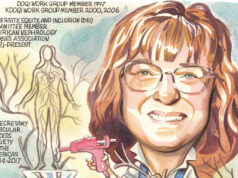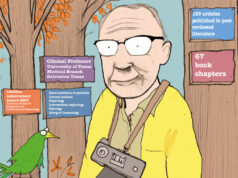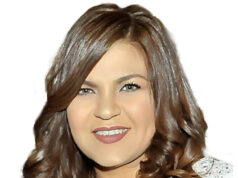 Aisha Shaikh’s career in general and interventional nephrology has seen her assume leading roles in vascular access clinics, dialysis units and transplant centres alike, caring for a wide variety of kidney patients in different settings and locations across the USA. Shaikh is currently an adjunct associate professor of Medicine and Nephrology at Mount Sinai’s Icahn School of Medicine and an associate clinical member at Memorial Sloan Kettering Cancer Center (both in New York), and the co-chair of the American Society of Diagnostic and Interventional Nephrology (ASDIN) Training and Workforce Committee. She is also an active participant in the nephrology community, as a member of the American Society of Nephrology (ASN), National Kidney Foundation (NKF) and American Society of Onconephrology (ASON). Here, Shaikh discusses all this and more, including a number of hot topics in the kidney care space, with Renal Interventions.
Aisha Shaikh’s career in general and interventional nephrology has seen her assume leading roles in vascular access clinics, dialysis units and transplant centres alike, caring for a wide variety of kidney patients in different settings and locations across the USA. Shaikh is currently an adjunct associate professor of Medicine and Nephrology at Mount Sinai’s Icahn School of Medicine and an associate clinical member at Memorial Sloan Kettering Cancer Center (both in New York), and the co-chair of the American Society of Diagnostic and Interventional Nephrology (ASDIN) Training and Workforce Committee. She is also an active participant in the nephrology community, as a member of the American Society of Nephrology (ASN), National Kidney Foundation (NKF) and American Society of Onconephrology (ASON). Here, Shaikh discusses all this and more, including a number of hot topics in the kidney care space, with Renal Interventions.
What initially attracted you to medicine, and the field of nephrology in particular?
As a child, I was in awe of doctors. I thought medicine was magic and doctors were magicians. When I was very young, I witnessed my mother receive treatment for and be cured of tuberculosis (TB), an illness that would have been fatal without anti-TB therapy. Anti-TB therapy is nothing short of a medical miracle. As I grew older, medicine became an obvious career choice for me. Practising medicine requires an understanding of science, puzzle-solving skills and an ability to interact with vulnerable people with illnesses—a challenging and stimulating combination. In medical school, my first clinical rotation was in nephrology. During that rotation, I had the opportunity to observe a kidney transplant surgery. I was in absolute awe; the sight of the kidney producing urine within a few minutes of being transplanted into the patient was nothing short of a miracle to me. Once again, it felt that medicine was magic. I was struck by how good nephrologists were at solving complex medical problems. By the end of my nephrology rotation, I wanted to be a nephrologist.
Who have your mentors been and how have they influenced your career?
I have been very fortunate to have outstanding nephrologists as my mentors, including William E Mitch, Rajiv Kumar, and Nelson Leung, who shaped my career. Something that they all have in common is an insatiable curiosity and a relentless desire to learn. I try to incorporate the lessons I have learned from them into my clinical practice.
How did your time in the US Department of Veteran Affairs impact your career in medicine?
I was the renal service chief and medical director of the Veteran Affairs (VA) dialysis unit for four years. During this time, our team made numerous changes in the structure of the renal programme to provide better care to the veterans. We created a dedicated vascular access team to monitor and treat vascular access issues in a timely manner. We lowered the dialysis catheter rate and increased the arteriovenous access rate among haemodialysis patients. During the COVID-19 pandemic, we were among the first haemodialysis units in the USA to administer COVID-19 vaccines to the veterans. The most important lesson I learned during my time at the VA was that, as physicians, we must fiercely advocate for the veterans and their needs. The veterans are the best among us and deserve the best from us.
Having worked in vascular access clinics, dialysis units and transplant centres, where do you think the most significant challenges lie in the treatment of kidney disease?
Educating nephrologists and the dialysis staff about dialysis vascular access care is critical in improving vascular access outcomes. High staff turnover in dialysis units is a massive challenge, as staff training requires time and effort. I have worked in several dialysis units in rural and urban settings. Access to care is a huge issue in rural areas where patients may have to drive for several hours for a dialysis vascular access procedure or a kidney transplant evaluation. These barriers can restrict patients’ access to care and prevent them from pursuing appropriate therapeutic options.
Why are professional organisations like ASDIN and ASN needed in the kidney care space?
ASDIN and ASN must continue collaborating with other professional societies, organisations and patient advocacy groups to advance kidney disease care. They must advocate at the legislative level to promote clinical care and research funding for kidney diseases.
What do you feel has been the most important development in the field of nephrology during your career?
Recognition of the benefits of sodium-glucose cotransporter-2 (SGLT2) inhibitors in diabetic and non-diabetic chronic kidney disease (CKD), understanding of the genetics of kidney disease using genome-wide association study, creation and utility of endovascular arteriovenous fistula in haemodialysis patients, use of novel therapies to reduce glucocorticoid exposure in glomerular diseases, and elimination of race from the estimated glomerular filtration rate (eGFR) calculation, represent important developments in the field of nephrology during my career.

Could you outline one particularly promising piece of research you are currently involved with?
Our group was among the first to report prolonged SARS-CoV-2 polymerase chain reaction (PCR) positivity in haemodialysis patients with COVID-19. We were also among the first to report the antibody response to the COVID-19 vaccine in haemodialysis patients. These studies were critical in expanding our understanding of SARS-CoV-2 infection and vaccination in the dialysis population, as there were no existing data on the novel SARS-CoV-2 virus. Currently, we are studying the impact of various cancer therapies on kidney function too.
Besides your own work, what is the most interesting piece of nephrology research you have seen in the past year?
I would say that the EMPA-KIDNEY trial is the most impactful trial in nephrology that will (hopefully) be published in the next few months. This trial was stopped early due to positive efficacy observed in the SGLT2 inhibitor arm. SGLT2 inhibitors have changed the landscape of diabetic and non-diabetic kidney disease management, and now we have tools to slow the progression of CKD. EMPA-KIDNEY will provide further insight into kidney disease patients who are more likely to benefit from SGLT2 inhibitors.
What are the most significant unmet needs in onco-nephrology right now—and how might they be resolved?
In my view, excluding patients with CKD from major cancer clinical trials is a significant problem. Inclusion of patients with kidney disease in clinical trials is essential to formulate an evidence-based approach for cancer treatment in patients with CKD. Additionally, we need better collaboration between the nephrology and oncology professional societies to develop clinical practice guidelines and design clinical trials.
Looking back over your career, could you describe one particularly memorable case or patient, and why it has stuck with you?
My most memorable patient is Susan (not her real name), who has end-stage kidney disease (ESKD). Her son with special needs also has ESKD and is on haemodialysis. As a nephrologist, I took care of Susan and her son. Despite her own health challenges, Susan was always there for her son. I was struck by her resilience and commitment to her son. When I relocated from Kansas to New York, Susan often sent me cards and letters as she was concerned about my wellbeing. People like Susan remind me that, no matter how tough life gets, one can always be kind to others.
What advice would you give to people embarking on a career in the field of nephrology?
This is an exciting time to embark on a career in nephrology. We are witnessing a surge in research and innovation that will inevitably lead to better therapeutic options for patients with kidney disease. My advice to the fellows would be to enjoy the training process; the ups and the downs will teach you a lot. Find a mentor early in your training, and do not be afraid to explore different career paths. At the end of the day, you must find joy in what you do, and greatness will follow.
What are your interests outside of the field of medicine?
My interests outside of medicine include travelling, cooking, and watching real-life crime shows. My most memorable travel experiences include Japan, Peru and New Zealand. I climbed Mount Fuji in Japan, hiked Machu Picchu in Peru, and visited Lake Crucible in New Zealand. I highly recommend the Salkantay trek to Machu Picchu, as it is far more scenic than the Inca trail. In addition to travelling and exploring nature, I enjoy cooking and oddly find it very relaxing. If you follow me on Twitter (@aishaikh), you have probably seen the food pictures that I often post. Lately, I have developed an interest in food presentation, and the art of food plating. It is famously said that we eat with our eyes, which makes food presentation so essential and enjoyable! Another favourite pastime of mine is watching real-life crime shows—which, I must admit, is not as relaxing as travelling and cooking but is fun nevertheless!
Fact file
Current appointments:
- Adjunct associate professor of Medicine/Nephrology, Icahn School of Medicine at Mount Sinai, New York, USA
- Associate clinical member, Department of Medicine/Renal, Memorial Sloan Kettering Cancer Center, New York, USA
Education:
- 1999–2000: Internship in Medicine and Surgery, Aga Khan University, Karachi, Pakistan
- 2002–2005: Residency in Internal Medicine, University of Texas Medical Branch, Galveston, USA
- 2005–2008: Fellowship in Nephrology and Hypertension, Mayo Graduate School of Medicine, Rochester, USA
- 2008: Interventional nephrology training, Lifeline Access Center, Wichita, USA
Honours (selected):
- 2005: Thomas N & Gleaves James Award for Excellent Performance by a Third Year Resident in Internal Medicine, University of Texas Medical Branch, Galveston, USA
- 2008: Nephrology Fellowship Outstanding Achievement award, Mayo Graduate School of Medicine, Rochester, USA
- 2017: Teaching Attending of the Year award, Icahn School of Medicine at Mount Sinai, New York, USA
- 2017–2021: Chief of Renal Division and Renal Transplant Center, James J Peters Veterans Affairs Medical Center, New York, USA
- 2022–present: Co-chair of American Society of Diagnostic and Interventional Nephrology (ASDIN) Training and Workforce Committee











